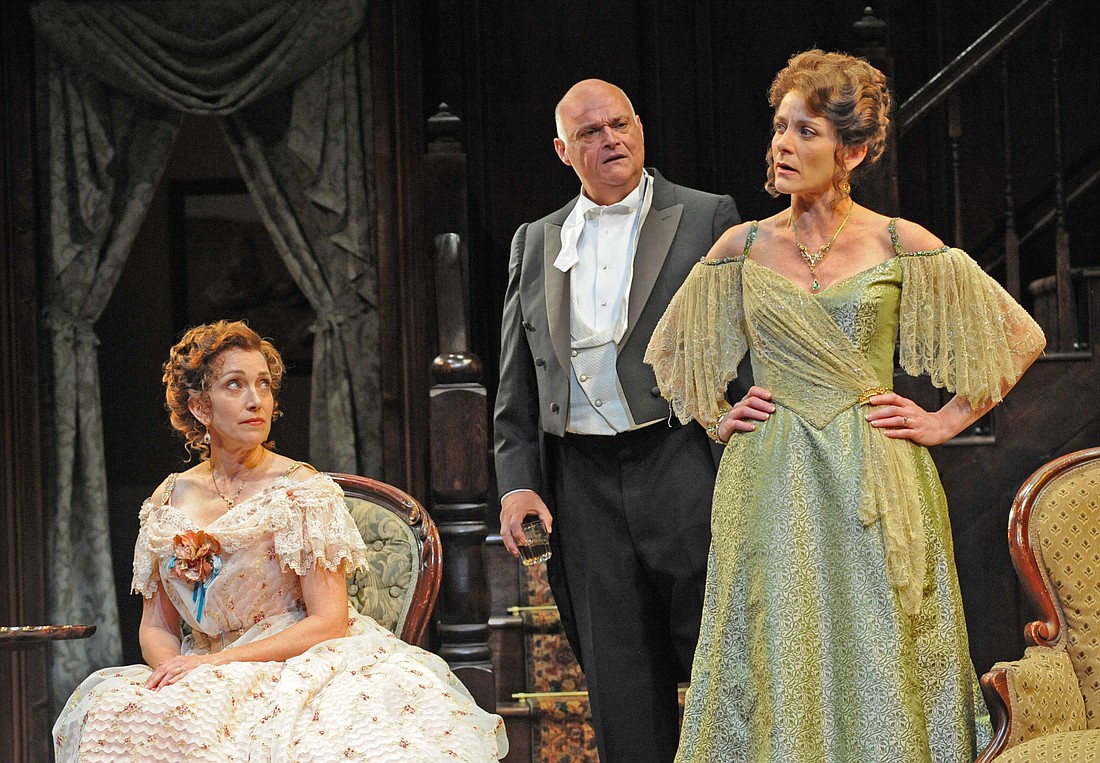- November 23, 2024
-
-
Loading

Loading

“Catch the foxes for us. All the little foxes are ruining the vineyards, and the grapevines are blossoming.”
— Song of Solomon 2:15
Ah, the Old South. It was a simpler time; a more gracious way of life. If you seriously believe that, you’d best skip the Asolo Rep production of Lillian Hellman’s “The Little Foxes.”
The play starts with a deal. The Hubbard siblings have just convinced a Chicago tycoon to bring his mill to their cotton fields. The cotton blossoms in sweet home Alabama, circa 1900. Labor is cheap and unions non-existent, so it’s a very good deal indeed. The two brothers and their sister stand to make a fast fortune. To seal the deal, the Hubbards need a big chunk of investment money. That’s the hitch.
Benjamin and Oscar Hubbard are flush. But their sister, Regina, has no money of her own. Horace Giddens, the banker she married, controls their irritatingly small fortune—and he’s been holed up in a Baltimore hospital for the last five months due to a bad heart. Strictly incommunicado, too. Horace refuses to answer his sister’s pleading letters about that old cotton mill! (A dark Satanic mill, the playwright makes clear.) The Hubbards collude, coerce, and send Horace’s daughter, Alexandra, on a train up to Baltimore. Cry, tell a sob story. Do what it takes to fetch the your daddy from his sick bed. Just get him here so we can get his share of the money! (That’s only one conniving scheme among many. Oliver also figures that first cousins are kissing cousins, and plans to marry Alexandra to his feckless son, Leo.) Horace finally arrives, looking like death warmed over, but stubborn as ever. He puts a damper on the Hubbards’ big scheme. He won’t give them a dime.
Various lies, thefts, dirty deals, manipulations, backstabbing betrayals and incidents of domestic abuse ensue. The grasping Hubbards (who come from a commercial background!) are clearly the baddies. They make Iago look like Dudley Do-Right. Their blood boils with a lust for money, money, money. Like Blanche DuBois, the angelic Giddens look to finer things. Piano duets, art and culture. The graciousness of the bucolic, agrarian Old South, and all that.
The playwright stacks the deck, but that’s what playwrights do. Behind it all, Hellman has a big moral point to make. (We’ll get back to that.)
Director Frank Galati honors the play’s emotional truths. He also tells a good crime story. “The Little Foxes” shares DNA with Agatha Christie’s drawing room detective dramas; it’s stuffed with safety deposit boxes, wills, letters, and various surprising discoveries. Galati keeps all the bits of business clear, without cluttering up the human drama.
David Breitbarth portrays Horace as a principled man with an unprincipled wife. His character’s knocking at heaven’s door, but he doesn’t milk it. His wife Regina (Tracy Michelle Arnold) is no virago. Arnold plays her as a strong woman without a shred of power. Against your will, she gets your sympathies. Their daughter Alexandra (Kelly Elizabeth Smith) seems clueless and sweet. She’ll either be a victim or find her inner toughness. Matt DeCaro plays Oscar as a thug in a nice suit. He’s civilized when he has to be, but slaps his wife when nobody’s looking. Birdie (Denise Cormier) is Oscar’s human punching bag. She’s a refined artistic soul who’s learned to say “yes” or keep her mouth shut, now coiled at the brink of hysteria, and self-medicating with booze. Their son Leo (Scott Kuiper), lacks the Hubbard clan’s amoral force-of-will. Not a rotten character; he simply lacks character. Ben (William Dick) is the nice Hubbard brother—fewer rough edges, but equally heartless. He’s not a good person, but he’s good at hiding. Tom Coiner perfectly embodies the no-nonsense Chicago tycoon. Taylar and Sean Blake play Addie and Cal, the African-American servants. They achieve great depth in the few scenes their characters get a chance to talk. (Hellman actually gives them some good lines—very rare for a play written in 1939). With scant words and gestures, Taylar and Blake convey lives of constant humiliation and casual abuse. The cringe-making N-word is thick in the air. But their characters stay poker-faced, and lock their true feelings inside.
Alan Schwanke’s overstuffed set design and Tracy Dorman’s overdressed costumes convey a clear message: These are rich folks. They’ve got it and they flaunt it. And couldn’t care less about all the poor folks outside.
And, yes, that’s Hellman’s big moral point.
It’s implied in the play’s title—a Biblical reference to ravenous animals that eat up the harvest. The repellant Oscar is even worse. He has a great time shooting birds and animals—and doesn’t eat them. The resulting game could feed a poor family for weeks. But he leaves his kills to rot. And, in case her point is still insufficiently clear, Hellman lets the Addie spell it out. In a soliloquy about the Hubbards and others like them, she says:
“Yeah, they got mighty well off cheating n——. Well, there are people who eat the earth and eat all the people on it like in the Bible with the locusts. Then there are people who stand around and watch them eat it…. Sometimes I think it ain’t right to stand and watch them do it.”
Without beating the dead horse of the McCarthy era, Hellman’s making an obvious criticism of the capitalist system. But a rock-ribbed Republican can still enjoy her play. With a slight shift of perspective, it’s a critique of unethical capitalists who abuse the system. Succinctly put:
Capitalism is an unethical system of devouring locusts.
Or, ethical capitalists shouldn’t act like devouring locusts.
Take it as you will. While you’re at it, if you see locusts devouring the earth, don’t just stand there watching, do something! But that still begs the question …
Why not bring the mill to the cotton fields?